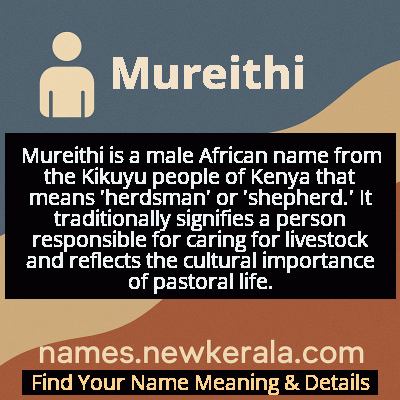Mureithi Name Meaning & Details
Origin, Popularity, Numerology Analysis & Name Meaning of Mureithi
Discover the origin, meaning, and cultural significance of the name MUREITHI. Delve into its historical roots and explore the lasting impact it has had on communities and traditions.
Name
Mureithi
Gender
Male
Origin
African
Lucky Number
4
Meaning of the Name - Mureithi
Mureithi is a male African name from the Kikuyu people of Kenya that means 'herdsman' or 'shepherd.' It traditionally signifies a person responsible for caring for livestock and reflects the cultural importance of pastoral life.
Mureithi - Complete Numerology Analysis
Your Numerology Number
Based on Pythagorean Numerology System
Ruling Planet
Uranus (Rahu)
Positive Nature
Strong sense of order, loyal, practical, and disciplined.
Negative Traits
Stubborn, overly serious, rigid, and prone to feeling restricted.
Lucky Colours
Blue, gray.
Lucky Days
Saturday.
Lucky Stones
Blue sapphire.
Harmony Numbers
1, 7, 8.
Best Suited Professions
Managers, engineers, accountants, organizers.
What People Like About You
Dependability, discipline, practicality.
Famous People Named Mureithi
John Mureithi
Business Executive
First African Managing Director of East African Breweries Limited
Dr. James Mureithi
Medical Researcher
Pioneering work in tropical medicine and public health in Eastern Africa
Peter Mureithi
Agricultural Economist
Leading expert in sustainable livestock management and pastoral economics
Joseph Mureithi
Civil Servant
Influential figure in Kenya's early agricultural development policies
Name Variations & International Equivalents
Click on blue names to explore their detailed meanings. Gray names with will be available soon.
Cultural & Historical Significance
The name also carries spiritual connotations, as livestock played crucial roles in traditional ceremonies, rituals, and as bride price. A Mureithi was expected to possess wisdom in animal care, knowledge of grazing lands, and the ability to protect the herd from predators and disease. This position required courage, patience, and deep understanding of nature's cycles. In contemporary times, while many bearers may not practice traditional herding, the name continues to honor ancestral traditions and serves as a reminder of the Kikuyu people's agricultural heritage and their relationship with the land.
Extended Personality Analysis
Individuals named Mureithi are often perceived as possessing natural leadership qualities combined with a protective and nurturing disposition. The name's association with shepherding suggests someone who is responsible, patient, and capable of guiding others with wisdom and care. They tend to be practical problem-solvers who approach challenges with methodical thinking and steadfast determination, much like a shepherd navigating difficult terrain while ensuring the safety of the flock.
Common traits include strong community orientation, reliability, and a deep sense of duty toward family and social obligations. Mureithi bearers are often seen as pillars of their communities—people who can be counted on in times of need and who possess the emotional intelligence to understand and support others. Their traditional association with livestock management translates metaphorically to modern contexts as individuals skilled in managing resources, people, or projects with careful attention and long-term vision. They typically exhibit calm authority rather than aggressive leadership, preferring to lead through example and earned respect.
Modern Usage & Popularity
In contemporary Kenya, Mureithi remains a respected and widely used name, particularly among Kikuyu families seeking to maintain cultural connections. While urbanization has reduced traditional pastoral lifestyles, the name continues to be popular as both a first name and surname, symbolizing pride in heritage. Its usage has expanded beyond rural communities to urban centers, where it serves as a cultural identifier and reminder of ancestral values. The name maintains steady popularity without being overly common, striking a balance between cultural authenticity and modern appeal. Younger generations bearing the name often appreciate its historical significance while adapting it to contemporary professional and social contexts.
Symbolic & Spiritual Meanings
Beyond its literal meaning, Mureithi symbolizes guidance, protection, and responsible stewardship in both literal and metaphorical senses. The name represents the ideal of caring leadership—someone who guides, protects, and nurtures others much like a shepherd tends to sheep. It carries connotations of wisdom gained through experience, patience in dealing with challenges, and the ability to provide security and direction. In broader symbolic terms, Mureithi embodies the concept of sustainable management, whether of natural resources, family welfare, or community development. The name also represents the bridge between traditional values and modern responsibilities, suggesting an individual who honors heritage while navigating contemporary complexities.

